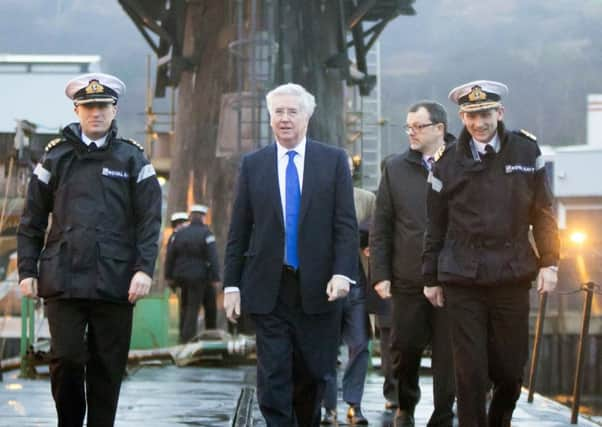Martyn McLaughlin: Obfuscation over Trident is not helped by a lack of scrutiny


If the might of Britain’s naval force cannot be certain of the direction in which its ballistic missiles will travel, what hope do our enemies have of second guessing their trajectory? Such is the dark ingenuity of nuclear deterrence, a game of bluff in which ambiguity, its guiding principle, has the added bonus of dispensing with quaint notions like accountability and domestic oversight.
There was no such cunning strategic thinking on show when Sir Michael Fallon answered Monday’s urgent question in the Commons about last year’s failed Trident test launch.
Advertisement
Hide AdAdvertisement
Hide AdInstead, it was an opportunity for the Defence Secretary to demonstrate an almost preternatural gift for obfuscation.
The UK government’s response to the matter has been lamentable. By wilfully conflating secrecy with discretion, it has treated parliament and the public with blunt contempt. Worse still, Mr Fallon’s appearance heralded the kind of alternative reality we on this side of the Atlantic thought was quarantined to the Trump administration.
Pressed repeatedly over the details of the test, he refused to confirm or deny reports an unarmed missile had veered off course towards the eastern seaboard of the US. Instead, he would only state that “HMS Vengeance successfully concluded her demonstration and shakedown operation.” In other words, the submarine and its crew fulfilled their duties; the success or otherwise of the actual test launch last June was explicitly ignored.
Mr Fallon told parliament no previous government had issued operational details about the deterrent, a bold assertion given a 2012 test was publicised in advance by the Cameron government in which Mr Fallon served as part of the cabinet.
Numerous other drills and operations have been disclosed in a similar fashion, some even coming prepackaged with video footage and quotes. It would not come as any great surprise were Britain’s four Vanguard-class submarines revealed to have their own Instagram accounts, complete with sepia filtered photographs of anonymous channels of the Atlantic and emojis wearing bicornes.
The anger amongst MPs was understandable, given the test took place just a few weeks before a major vote to ratify the £179 billion Successor programme. Yet comparing and contrasting that parliamentary session with the one that took place on Monday should remind us that the government’s sophistry is not the only unedifying aspect of the affair.
The past 48 hours have heralded a torrent of hypocritical and opportunistic demands for scrutiny and disclosure of Trident’s testing regime, all of which have emanated from parliamentarians too meek or heedless to consider such issues when they truly mattered – in the lead up to the July 2016 vote.
The interrogative appetite in force the other day was absent from last summer’s six-hour debate, a session so logjammed with hoary issues and moral grandstanding that visitors would have been forgiven for thinking they had stumbled into an undergraduate debating society.
Advertisement
Hide AdAdvertisement
Hide AdIf that observation appears to rely on the benefit of hindsight, consider the evidence concerning the Trident programme in its entirety.
Tests are neither rare nor clandestine. The latest is the fifth since the turn of the millennium. The fact that not one MP thought to press the government – or submit a timely written question – ahead of such a defining vote is regrettable.
To borrow that timeless phrase from Donald Rumsfeld, problems identified during Trident’s testing regimes are hardly unknown unknowns.
The programme’s early years were beset by a series of hitches, or as the Pentagon says, “broken arrows”. In 1978, a missile exploded seconds after its launch from a test range, while the first sea launch the following year ended disastrously after the missile veered off course, forcing its remote detonation. Four other tests of Trident’s first generation ended in failure throughout the 1980s.
The succeeding class, Trident II D-5, the model used in last year’s test, fared little better at first. Over the course of 1988 and 1989, four missiles tested by the US either exploded prematurely or lost control.
It has been rightly pointed out that developmental test procedures are designed to identify and remedy faults. Britain’s overriding nuclear strategy of “minimum deterrence” is dependent entirely on the credibility of its weapons system – that very word featured no less than 32 times in the government’s 2013 Trident Alternatives Review.
For that reason, however, it remains incredible that no-one in parliament asked the most obvious questions last year – how has Trident’s credibility been assessed in recent years, and what plans are in place should the deterrent be affected by a critical failure?
It seems preposterous, but there has been only the one comprehensive review of the safety of Britain’s nuclear stockpile. Helmed by Sir Ronald Oxburgh, then chief scientific adviser at the Ministry of Defence, the 1992 report catalogued 19 “incidents” stretching back to the dawn of the Cold War.
Advertisement
Hide AdAdvertisement
Hide AdThe most disconcerting aspect of the study was the indeterminate nature of its conclusions. In a thinly veiled criticism of the material at his disposal, Oxburgh noted: “We do not have any way of knowing whether this information is complete.”
A quarter of a century later, there remains no way of knowing. We should not expect candour from this government, but nor should we expect negligence on the part of its opponents.